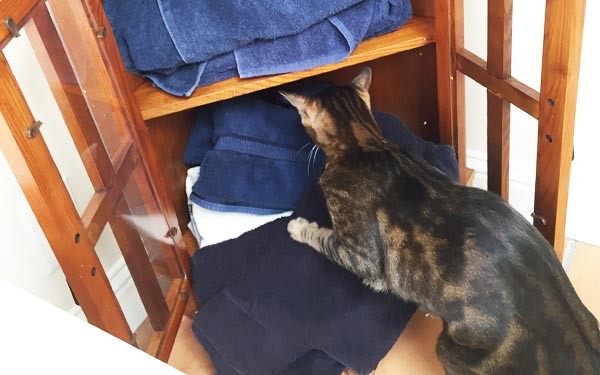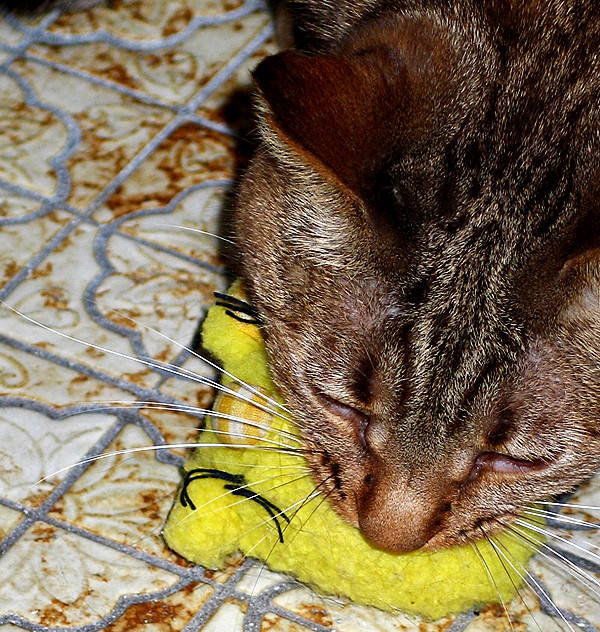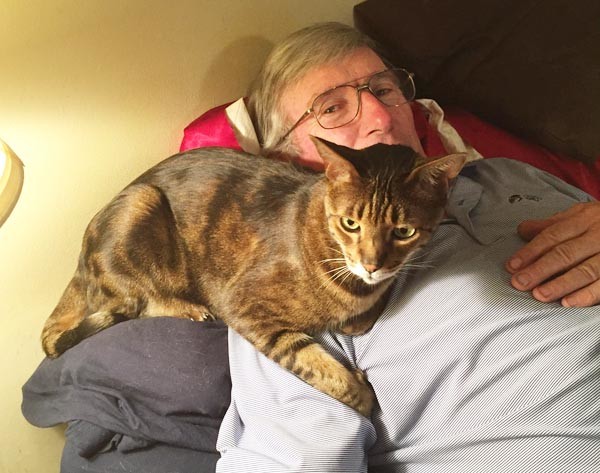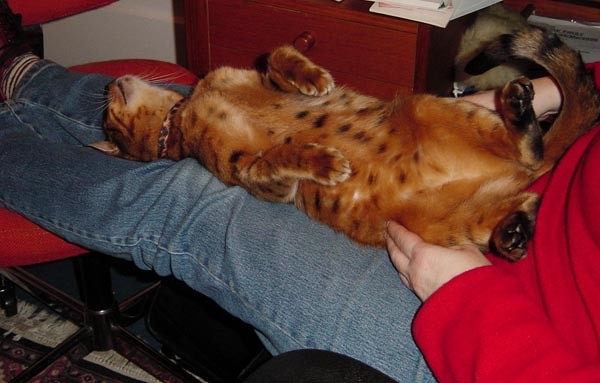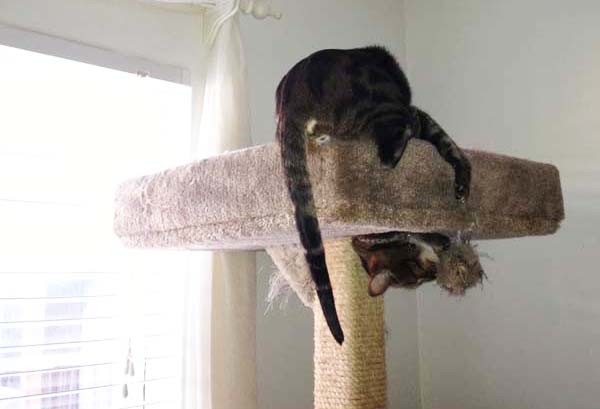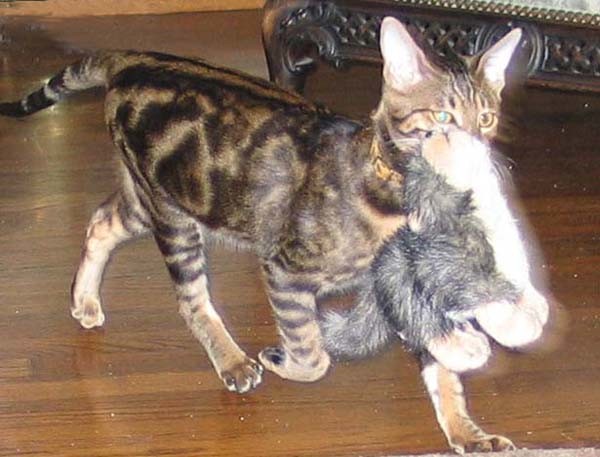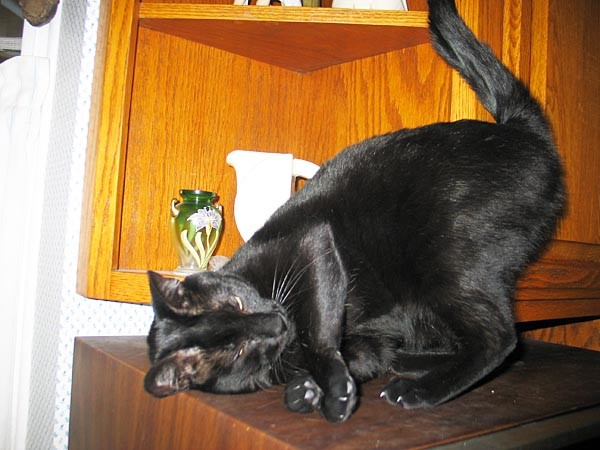Are These Cats for You?
Bengals, Savannahs, Chausies and other domestic cats with recent wild cat ancestors are wonderful companion pets in the right homes. Before adopting, do your research and find out if they are the right breeds for you. It's heart breaking and stressful for everyone when cat adoptions don't work out.
Before adopting cats of any breed, do your homework and research them. Not every breed or every cat is suited to everyone’s life style and household. Some breeds are high maintenance—they need daily grooming or weekly baths. Others are known for their loud vocal skills while others are highly energetic and thrive on attention. Before bringing a cat home, ask yourself the hard questions and select a kitty who will fit in with your life style and household. Adopting cats should never be spur of the moment events.
Bengals, Savannahs, Chausies & friends
Bengals, Savannahs, Chausies and other domestic cats with recent wild-cat ancestors are fabulous companions—but only in the right homes. Although easy to be seduced by their wild and exotic looks, there is so much more to them. In addition to their dazzling beauty, these kitties are energetic athletes who are smart, sensitive and often are attention seekers.
Interior decorators
You need a sense of humor when living with these kitties. Possessing smarts and thriving on attention, they often invent ways of keeping themselves amused that are surprising, funny, unpredictable and sometimes annoying.
My Bengals have a thing for shiny things. Maulee, a Bengal who passed when she was 21 years old, was a jewelry collector. She’d open the drawers and boxes where I kept my jewelry, select shiny earrings and necklaces and stash them throughout my house. Her favorite caches were in back of sofas and under rugs. To this day I haven’t found all of her hiding places. Thanks to Maulee, wearing mismatched earrings became my personal fashion statement.
Sudan, my Savannah has a habit of opening the cabinet doors in the bathroom and pulling out the towels. Often I find him curled up among them, soundly sleeping.
These smart cats need stimulation. They don’t do well when left alone for hours every day without something to do or a buddy to hang out with. Without enrichment and stimulation, they can become bored and find ways of entertaining themselves that aren’t always appreciated by the human residents.
Expressive!
Be prepared for loud talkers who express themselves through a large repertoire of vocalizations that include soft trills and chatter, sweet mews and loud howls and cries.
Maulee used to sing duets with me. Our favorite was the Maulee Bolt song. I would sing a verse, pause and she would take the cue and loudly chirp 3 times. Her timing was impeccable for each of the 20 verses. She enjoyed the attention and exchange—I always reinforced her for her talent. Maulee, a typical attention seeking Bengal, figured out ways to get me to interact with her. One was putting her head next to my ear and loudly chirping her verse while I napped.
Olivia, a Bengal, still has her toy that was firmly clutched in her mouth when I rescued her 14 years ago. That toy still accompanies her everywhere; she sleeps with it and carries it from room to room. It’s also a bargaining tool. When Olivia’s hungry, she seeks me out and drops the toy at my feet while making loud, plaintive meows that can be heard throughout my house. I admit that I reinforce the behavior by giving her what she wants.
Sudan cries and calls at every opportunity. Sometimes when I leave the room he’ll call loudly to me. He’ll also broadcast his feelings when one of the other cats settles herself in his favorite spot.
I hold conversations with all of my cats. I call their individual names and they answer.
If you love cats who are vocal than check out Bengals, Savannahs and Chausies—they may be a good match. On the other hand, if you don't enjoy verbally expressive cats or you live in an apartment with thin walls and neighbors who don’t appreciate loud cats, think twice before adopting these breeds.
Besties
It isn’t unusual for these sensitive kitties to form strong bonds with special individuals, favoring one person over another. Although, they aren’t considered lap warmers (some are), they demonstrate affection in a number of other ways that include: following their chosen person from room to room, settling near them, chatting, bringing toys, and other creative behaviors. Some are so deeply bonded with a special someone that they’ll grieve or develop separation anxieties when rehomed.
Maulee was 7 years old when I adopted her. She did not readily adapt to her new home or to me and she hated everyone. The little one would swat and hiss at anyone who dared to get within 10 feet of her. It took about 2 months until she felt secure enough to initiate socializing. After another 3 months and lots of reinforcement she started following me from room to room, sitting on my desk and sleeping on my pillow. If I was in a different area of the house she’d seek me out, often calling for me. Although Maulee didn’t shy from other people, it was obvious that she wasn’t drawn to them. I was her person and she was my heart cat. And, yes, she became a precious lap cat.
Although most felines don’t do well with change, these breeds are more sensitive than most. They do best in a stable household with people they develop bonds with. Major changes, such as being rehomed and adjusting to new owners, stress them.
Energetic busy bodies
Bengals, Savannahs and Chausies are bundles of energy; most love to play, chase, jump and climb. These acrobats don’t live a sedentary life style and need plenty of stuff to do, high places to hang out on and lots of quality time with their people. Although they do settle down with age, they are more active than most.
Olivia will do whatever it takes to get me to play with her. She’ll jump on my desk and knock everything down. When I don’t immediately respond, she’ll up the ante by bringing me her favorite toy and dropping it in my coffee or water while loudly vocalizing. Sometimes, she’ll grab my glasses and run down the hall with them. All of my cats enjoy fetching—they eagerly bring their toys, drop them at my feet for me to throw, chase them down the hall and bring them back. Sudan holds the record: 45 minutes of non-stop fetching.
These active breeds are busy—they thrive on attention and interacting with their people. They make great companions for people who can spend time with them every day, channeling their busy energy into play as well as other activities.
Fast learners
They are fast learners and easy to train. Although all of my cats are clicker trained, they also have a large repertoire of behaviors they’ve learned without formal training.
Sudan will give kisses when I ask—not just to me. A few years ago we were being filmed for a news segment. I told him to go up and give the interviewer a kiss—he did, right on his lips. Luckily the interviewer had a great sense of humor.
Jinniyha, my melanistic Bengal, watched me every week take a part a small water fountain, piece by piece, wash and then reassemble it. One day I came home and found it in pieces. She had separated and removed every piece, including the parts in the pump. Many were missing, including the impeller. She dropped it in my coffee a couple of days later.
Clicker training, based on positive reinforcement, is an effective and fun method for teaching and reinforcing good behaviors.
It didn’t take long to train Sudan to go to his carrier, open the door, go in and then close it on cue. Like all of my cats, he also sits, shakes hands, jumps through hoops as well as does other parlor tricks on cue.
Don’t adopt Bengals, Savannahs, Chausies and others on a whim. It’s heartbreaking for everyone when cats don’t fit into lifestyles and households. Take your time, do your homework and make sure that you can give the kitty a stable environment, with lots of attention, stimulation and enrichment. If you decide that these special felines are for you, consider adopting a bonded pair. They will keep each other company while you’re away from home.


